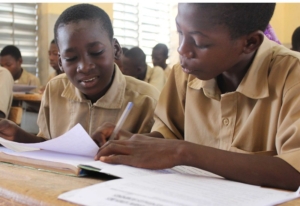Solar Energy for Education: Access To Learning in Burkina Faso
 Located in the heart of West Africa, Burkina Faso is leading in educational innovation by making strides to ensure clean and reliable energy for learning. Numerous initiatives aimed at enhancing education in the country led to the creation of various programs supported by national and international organizations like the World Bank and the World Food Program (WFP).
Located in the heart of West Africa, Burkina Faso is leading in educational innovation by making strides to ensure clean and reliable energy for learning. Numerous initiatives aimed at enhancing education in the country led to the creation of various programs supported by national and international organizations like the World Bank and the World Food Program (WFP).
Promoting Education in Dori
GSOL Energy has successfully installed a 20-kilowatt-peak (kWp) solar photovoltaic (PV) system at the Digital Learning Center in Dori, Burkina Faso. Furthermore, the project, initiated by the WFP, is part of a broader effort to improve education in rural areas by providing reliable access to electricity.
The new solar PV system supplies a stable and sustainable power source, ensuring the Digital Learning Center in Burkina Faso operates continuously, even during extreme weather or inconsistent sunlight. The system also includes key features that boost its performance and efficiency, including:
- Roof-mounted solar panels optimised for peak efficiency.
- 20 kWh inverter system enabling autonomous operation.
- Battery backup providing up to 12 hours of continuous power.
- Remote monitoring is used to track performance in real-time.
- Air-conditioned enclosure safeguards system components against extreme heat and dust.
As part of the project, local staff were trained in operating, maintaining and troubleshooting the solar system. This approach enables the learning center to manage the system independently, helping to ensure its long-term sustainability.
The Lighting Africa Project
The Lighting Africa project, funded by the World Bank through Burkina Faso’s Ministry of Energy and implemented in partnership with Innovation Energie Development (IED), promotes sustainable energy solutions. This project significantly enhances the use of solar technology in rural Burkina Faso and establishes quality standards in renewable energy. This project aims to improve energy access for 400 off-grid primary schools in Burkina Faso.
A key feature of the project is the introduction of solar libraries, which will provide 25,000 certified solar lamps to schools. Additionally, students can rent these lamps to study and complete essential tasks at home. Families can access reliable lighting without facing upfront costs by keeping ownership with the schools.
In addition to providing essential lighting, this project seeks to increase awareness and demand for certified solar products in remote villages, which may not have grid electricity for at least the next 10 years. Measures will be implemented to develop a sustainable commercial network for selling certified solar lamps and kits near the schools.
Digital Inclusion
The Resource Center in Ouagadougou, co-founded by Christophe Oulé, promotes accessible information and communication technology. Its members are developing digital tools such as solar-powered audio devices, e-readers, Braille printers and accessible textbooks to support inclusive education for people with disabilities.
In 2021, the center achieved remarkable progress by translating 150 books into the barrier-free EPUB format, enhancing access to knowledge for individuals with visual impairments. An additional 54 books have been scanned and are on the verge of being digitized, making them accessible for both auditory and Braille formats.
The center not only provides essential educational materials for blind students but also includes novels, making literature accessible to all. Using 11 laptops and 10 tablets, audio content is conveniently transferred to small memory cards, allowing students to engage with learning resources fully. Moreover, students can take advantage of a Braille printer, enabling them to print and read their lessons in Braille, further fostering an inclusive educational environment.
Planning for the Future
The World Bank has invested significantly in Burkina Faso’s education sector. It has approved the $140 million Restoring Education System Performance and Improving Resilience (REPAIR) project on May 5, 2025. This initiative also allocates a $10 million grant to support Host Communities and Refugees.
Currently, the project is seeking co-financing from the Global Partnership for Education. Its goals include expanding access to pre-primary and primary education, enhancing student learning outcomes and strengthening the overall educational services available in the country. This comprehensive strategy ensures a more resilient and effective education system, benefiting local communities and refugee populations.
Key priorities are developing infrastructure resilient to climate instability, providing emergency education for at-risk groups, improving the quality of learning and strengthening institutional capacity for effective decision-making. The project is divided into four components: increasing educational access, aiding emergency education, enhancing foundational learning quality and building institutional capacity.
These combined efforts reflect a clear push toward a more inclusive and sustainable education system in Burkina Faso. Indeed, with support from global partners, the country is making strides in expanding access, improving quality and building resilience in education for all.
– Vanuza Antonio
Vanuza is based in the UK and focuses on Good News and Global Health for The Borgen Project.
Photo: Flickr
